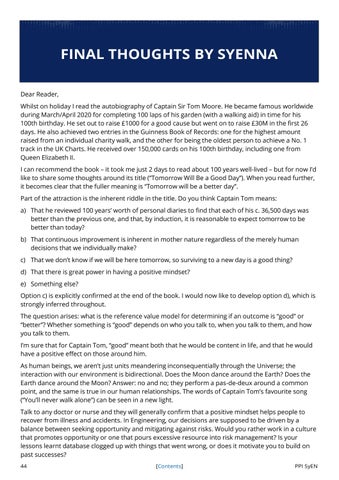FINAL THOUGHTS BY SYENNA FINAL THOUGHTS BY SYENNA
Dear Reader, Whilst on holiday I read the autobiography of Captain Sir Tom Moore. He became famous worldwide during March/April 2020 for completing 100 laps of his garden (with a walking aid) in time for his 100th birthday. He set out to raise £1000 for a good cause but went on to raise £30M in the first 26 days. He also achieved two entries in the Guinness Book of Records: one for the highest amount raised from an individual charity walk, and the other for being the oldest person to achieve a No. 1 track in the UK Charts. He received over 150,000 cards on his 100th birthday, including one from Queen Elizabeth II. I can recommend the book – it took me just 2 days to read about 100 years well-lived – but for now I’d like to share some thoughts around its title (“Tomorrow Will Be a Good Day”). When you read further, it becomes clear that the fuller meaning is “Tomorrow will be a better day”. Part of the attraction is the inherent riddle in the title. Do you think Captain Tom means: a) That he reviewed 100 years’ worth of personal diaries to find that each of his c. 36,500 days was better than the previous one, and that, by induction, it is reasonable to expect tomorrow to be better than today? b) That continuous improvement is inherent in mother nature regardless of the merely human decisions that we individually make? c) That we don’t know if we will be here tomorrow, so surviving to a new day is a good thing? d) That there is great power in having a positive mindset? e) Something else? Option c) is explicitly confirmed at the end of the book. I would now like to develop option d), which is strongly inferred throughout. The question arises: what is the reference value model for determining if an outcome is “good” or “better”? Whether something is “good” depends on who you talk to, when you talk to them, and how you talk to them. I’m sure that for Captain Tom, “good” meant both that he would be content in life, and that he would have a positive effect on those around him. As human beings, we aren’t just units meandering inconsequentially through the Universe; the interaction with our environment is bidirectional. Does the Moon dance around the Earth? Does the Earth dance around the Moon? Answer: no and no; they perform a pas-de-deux around a common point, and the same is true in our human relationships. The words of Captain Tom’s favourite song (“You’ll never walk alone”) can be seen in a new light. Talk to any doctor or nurse and they will generally confirm that a positive mindset helps people to recover from illness and accidents. In Engineering, our decisions are supposed to be driven by a balance between seeking opportunity and mitigating against risks. Would you rather work in a culture that promotes opportunity or one that pours excessive resource into risk management? Is your lessons learnt database clogged up with things that went wrong, or does it motivate you to build on past successes? 44
[Contents]
PPI SyEN



